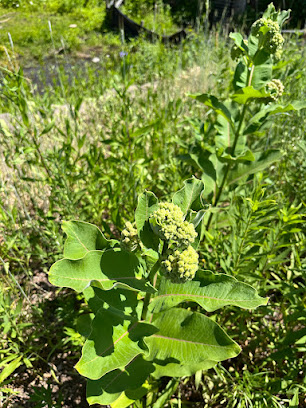If you pass by, you'll see the cattails that we're hoping to keep contained in one corner. The cloud of gray-green beyond is an annual grass planted by contractors as a cover crop, dotted with the deeper green of all the pre-existing native plants now re-emerging from their roots.
If you look a little closer, you may see some native blue-flag irises still blooming, happy as clams in this wet world.
On drier ground, the common milkweed is about to bloom.
Bindweed, in the morning glory family, is advertising its location. It's a non-native vine that is too aggressive. While I went around pulling it out (if we could use herbicide, we could kill its roots and be freed of an ongoing task), I checked to see what other plants are rebounding.
Joe Pye Weed is back, as is fringed sedge.
Good to see boneset and Hibiscus popping up. They don't look like much now, but a (wild) gardener can see the promise in these little nubbins.
It can be a challenge to distinguish a blackhaw viburnum sprout from
silky dogwood. Both of these, along with elderberries, will grow back from their roots to become big shrubs. Since trees become oversized for the site, these shrubs will have to do as places for birds to land and hide. Large shrubs will also help curb the expansionist tendencies of cattails.
The ponds have water, despite the extended drought--sign that the sump pumps are now functioning again, delivering water from the school's basement up into the wetland.
On drier ground, the common milkweed is about to bloom.
Bindweed, in the morning glory family, is advertising its location. It's a non-native vine that is too aggressive. While I went around pulling it out (if we could use herbicide, we could kill its roots and be freed of an ongoing task), I checked to see what other plants are rebounding.
Joe Pye Weed is back, as is fringed sedge.
Good to see boneset and Hibiscus popping up. They don't look like much now, but a (wild) gardener can see the promise in these little nubbins.
It can be a challenge to distinguish a blackhaw viburnum sprout from
silky dogwood. Both of these, along with elderberries, will grow back from their roots to become big shrubs. Since trees become oversized for the site, these shrubs will have to do as places for birds to land and hide. Large shrubs will also help curb the expansionist tendencies of cattails.
We'll see how the lack of shade, now that trees have been removed, will affect the balance of the various species. Some plants like cattails and lizard's tail may spread more aggressively now that they are in full sun. But overall, the rebound is looking good.









So happy to see this.
ReplyDelete